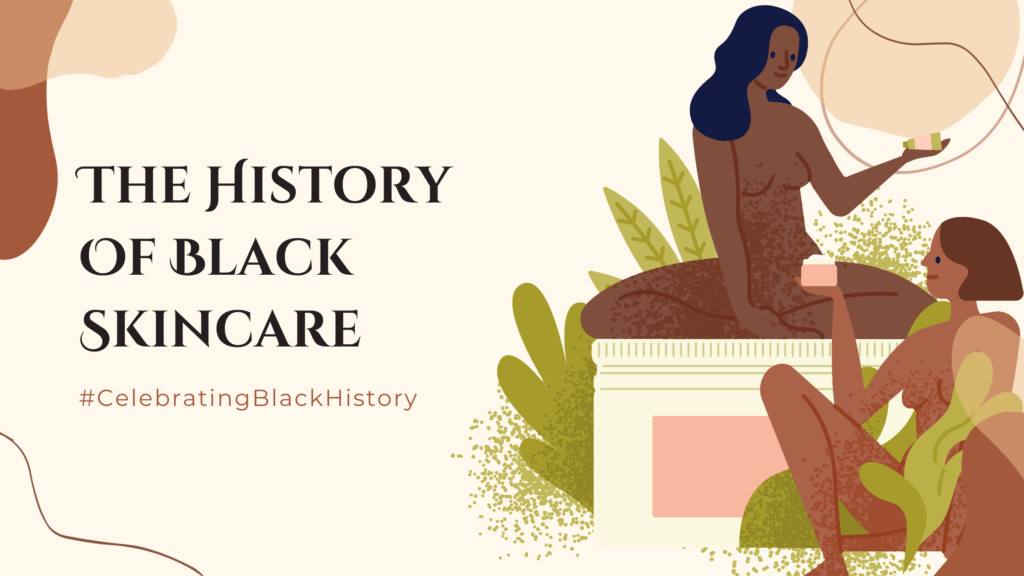Black History Month is an annual observance in the United States and Canada that recognizes and celebrates the contributions and achievements of Black people. It takes place in February in the US and the month of February is officially designated as National African Canadian Heritage Month in Canada. The observance highlights the achievements and contributions of Black people and promotes greater awareness and understanding of Black culture and history. It provides education and cultural awareness and is a time for reflection and introspection on ways to create a more inclusive and just society by breaking down barriers of discrimination and prejudice. LASPA acknowledges the importance of fostering a more diverse environment, particularly in the skincare industry, as black skincare has been neglected and overlooked by mainstream skincare, making it challenging for black individuals to find products suitable for their needs.


The History of Black Skincare:
The history of skincare for Black people has been shaped by a complex interplay of cultural traditions, societal norms, and scientific advancements. Over the centuries, Black people have used a range of natural ingredients and traditional home remedies to care for their skin and hair. However, for much of the 20th century, the beauty industry largely ignored the unique needs of Black skin and instead marketed products with harmful ingredients to this demographic. In recent years, there has been a growing recognition of the need for inclusive and culturally-sensitive skincare within the larger beauty industry, leading to an increase in the availability of products formulated specifically for Black skin.
Traditional Skincare Practices:
For generations, Black people have relied on natural ingredients and traditional home remedies to care for their skin and hair. For example, shea butter, coconut oil, and aloe vera have long been used as moisturizing agents, while neem oil has been used to treat skin conditions like eczema and psoriasis.
In Africa, for example, the use of natural ingredients for skincare and beauty has been an integral part of cultural tradition for centuries. For example, in ancient Egypt, Cleopatra is said to have used a combination of milk and honey as a face mask to keep her skin soft and supple. In Nigeria, the Yoruba people have a rich tradition of using shea butter and palm oil to care for their skin, while in Ghana, the Ashanti people have long relied on shea butter and coconut oil to hydrate and protect their skin from the sun.
Similarly, in the Caribbean, traditional skincare practices have been passed down from generation to generation, often based on ingredients like coconut oil and aloe vera that are readily available in the region. For example, in Jamaica, the use of coconut oil for hair and skincare is a well-established tradition, while in Haiti, aloe vera is often used to treat sunburn and other skin conditions.
The Beauty Industry and Black Skin:
For much of the 20th century, the beauty industry largely ignored the unique needs of Black skin and instead marketed products with harmful ingredients to this demographic. For example, many skin lightening products, which contain harmful ingredients like mercury and hydroquinone, have been marketed to Black people under the guise of improving skin tone and correcting perceived skin imperfections.
Additionally, many skincare and cosmetic products were designed with fairer skin tones in mind and were not tested on Black skin. As a result, many products caused irritation and other adverse reactions in Black people, further exacerbating existing skin concerns.
This began to change in the late 20th and early 21st centuries, as a growing number of Black-owned skincare brands emerged, offering products specifically formulated for Black skin. These brands often relied on natural and culturally-specific ingredients, drawing on traditional skincare practices and modern science to create products that address the unique needs of Black skin.
Recent Developments in Skincare for Black People:
In recent years, there has been a growing recognition of the need for inclusive and culturally-sensitive skincare within the larger beauty industry. This has led to an increase in the availability of products formulated specifically for Black skin, as well as a growing focus on diversity and inclusivity in the marketing and branding of skincare products.
For example, there has been a growing focus on the use of natural and organic ingredients in skincare for Black people, reflecting a growing interest in sustainable and environmentally-friendly products. LASPA is one of the brands that specializes in formulating skincare products using natural and organic ingredients that are suitable for all skin types. Recognizing the scarcity of mineral sunscreens available for individuals with darker skin tones, we created the first natural mineral sunscreen that accommodates all skin types. This allows individuals with darker skin to utilize sunscreen without the common white cast that is left behind from most sunscreens in the market. The development of this product required multiple trials and errors, with the assistance of a BIPoC focus group. As a result, LASPA has created five different skin shades of its tinted matte sunscreen, eliminating the issue of ashiness/whiteness that has prevented individuals of color from adequately protecting their skin from the sun. As we commemorate Black History Month, we reaffirm our dedication to promoting inclusivity in skincare and honoring the diversity of skin tones and types.




